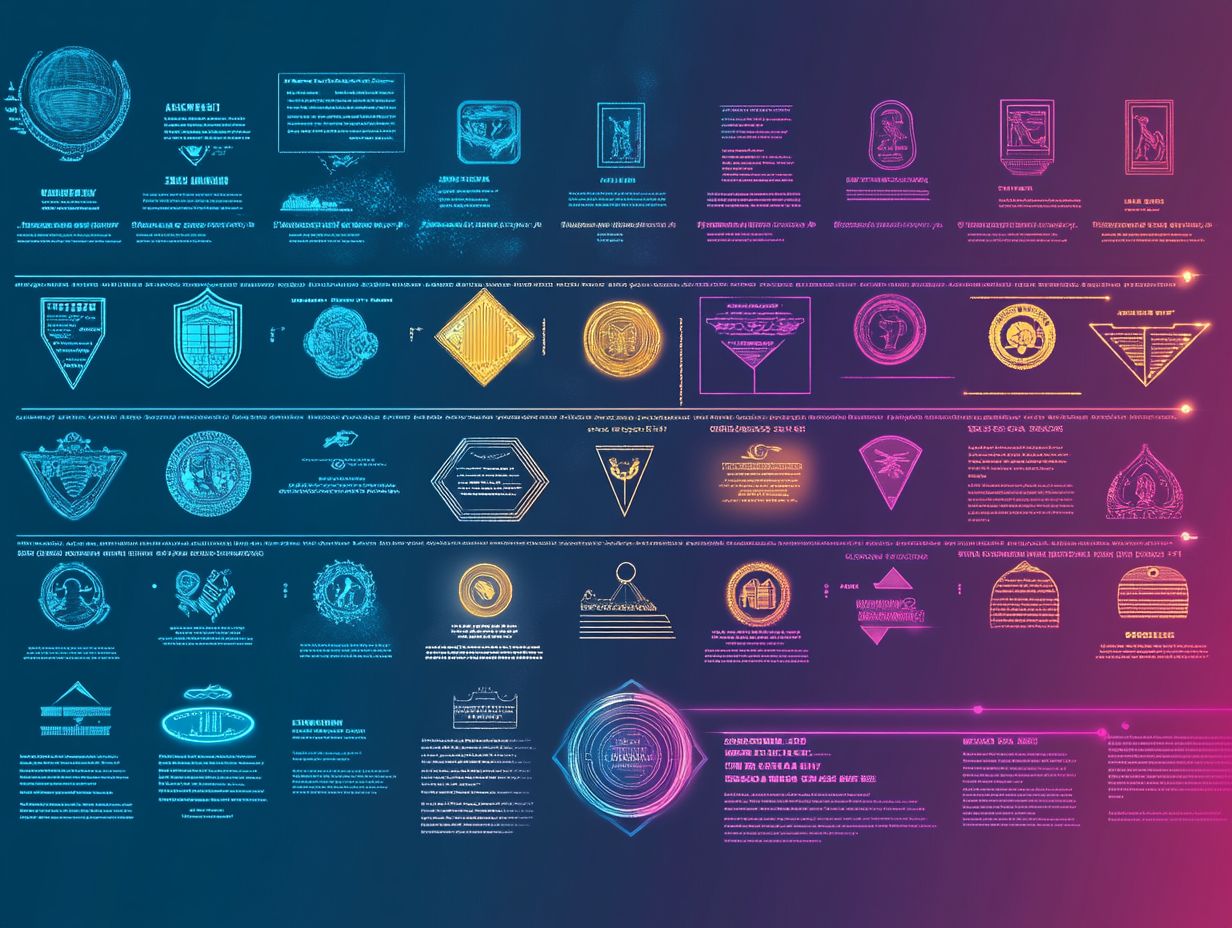The Evolution of Business Certifications Over the Years
In today s ever-evolving business landscape, certifications have become indispensable for professionals like you who aim to enhance skills and distinguish themselves in competitive markets.
This article delves into the rich history of business certifications, tracing their origins and early developments. It examines their significance for individuals and organizations, explores how certification standards have transformed over time, and highlights some of the most coveted credentials in the industry today.
It also looks at emerging trends shaping the future of workforce qualifications. Jump in and find out how certifications can supercharge your career and help you adapt to the dynamic business environment.
Contents
- Key Takeaways:
- History of Business Certifications
- The Importance of Business Certifications
- Evolution of Business Certifications
- Popular Business Certifications Today
- Future Trends in Business Certifications
- Anticipated Developments and Impact on the Workforce
- Frequently Asked Questions
- What are business certifications and why are they important?
- How have business certifications evolved over the years?
- What are some examples of traditional business certifications?
- How have online certifications impacted the evolution of business certifications?
- What are some emerging trends in business certifications?
- Are business certifications necessary for career advancement?
Key Takeaways:

The evolution of business certifications has been shaped by the changing needs of the business world, with origins dating back to the evolution of educational certifications over the years in the professional realm.
These certifications hold great importance, providing benefits such as improved credibility, marketability, and competitiveness. For a deeper insight, refer to understanding business certifications, as the landscape continues to evolve, reflecting the ever-changing demands and advancements in various industries.
History of Business Certifications
The history of business certifications unfolds like a rich tapestry, intricately woven through the evolution of the business landscape. This journey highlights the increasing significance of official acknowledgment of skills, competencies, and the role of business certifications in career growth in entrepreneurship.
From early initiatives designed to stimulate economic growth for minority and women-owned businesses to the rigorous standards established by organizations like the Project Management Institute, certifications have emerged as crucial milestones.
They shape the landscape of business opportunities and enhance networking and professional development across a myriad of industries, including project management.
Origins and Early Developments
The origins of business certifications can be traced back to a time when recognizing diverse ownership and management was crucial for gaining access to federal contracting opportunities and resources, highlighting the value of business certifications in today’s market.
In the 1980s, the U.S. government acknowledged the necessity of supporting minority and women-owned businesses to foster a more equitable economic landscape. This era led to the creation of specific certifications, such as the Minority Business Enterprise (MBE) and the Women Business Enterprise (WBE) certifications.
These initiatives were crafted to dismantle systemic barriers faced by underrepresented groups in business, enabling them to compete more effectively in the marketplace. The impact of these certifications has been significant, granting essential access to procurement opportunities and cultivating a diverse pool of suppliers, thereby enriching the overall business environment.
The Importance of Business Certifications
Business certifications have become essential for you and your organization, serving as a powerful means to validate expertise and broaden networking opportunities.
By obtaining certifications like the Project Management Professional (PMP), you not only refine your project management skills but also align yourself with globally recognized standards in the field. This alignment elevates your professional profile and positions you as a trusted expert in a competitive landscape.
Get certified today to boost your skills and stand out in your field!
Benefits for Individuals and Organizations

Pursuing business certifications offers numerous benefits for you and your organization. These include career advancement, improved project management skills, and valuable networking opportunities.
Certifications provide specialized knowledge that can enhance your job prospects and boost your salary. They also serve as a strategic asset for your organization.
A focus on continuous learning empowers your teams with credentials like PMP (Project Management Professional), Six Sigma (a method for process improvement), or ITIL (Information Technology Infrastructure Library). This helps ensure project execution aligns with industry best practices.
Skill development improves performance and boosts leadership capabilities, driving economic growth.
Organizations that prioritize certified professionals often see significant improvements in project outcomes. This leads to greater client satisfaction and a competitive edge.
Evolution of Business Certifications
The evolution of IT certifications over the years reflects major changes in certification programs. This shift highlights the growing demand for diverse skill sets across different industries.
Changes in Certification Standards and Requirements
Certification standards have transformed significantly. Organizations like the Project Management Institute (PMI) and ISO 9001 now set benchmarks that shape professional development in business certifications.
These standards reflect today s dynamic business landscape, where methods like Agile and Lean are essential. Embracing these requirements enhances your skills and keeps your organization competitive.
High standards build stakeholder confidence and enhance your organization s credibility. This commitment to quality benefits both you and your organization, leading to sustained growth.
Popular Business Certifications Today
Numerous business certifications are in high demand today. There is a strong focus on project management and Agile methodologies in the fast-paced business environment.
Overview of Top Certifications in Different Industries

Top certifications like PMP and Agile certifications are highly regarded in various industries. They are known for their rigor and relevance in addressing today s business challenges.
These credentials represent a deep understanding of vital methodologies that drive team success.
In fields like information technology, certifications such as Certified Information Systems Security Professional (CISSP) and AWS Certified Solutions Architect are critical. They validate technical expertise and equip professionals to handle complex projects and mitigate risks.
As industries evolve, these certifications are essential for ongoing professional development, helping you adapt to changing demands.
Future Trends in Business Certifications
As the business landscape evolves, expect future trends in certifications to focus on advanced project management tools and methodologies. These trends will promote economic growth while diversifying training programs, keeping you competitive.
Anticipated Developments and Impact on the Workforce
Anticipated developments in business certifications will greatly influence the workforce by elevating project management skills and fostering diversity through targeted training programs.
Organizations face challenges from skill gaps caused by new technology and changing business needs. The job market will demand a workforce that is adaptable and proficient in collaboration and innovation.
A diverse workforce opens doors to creative solutions and enhances problem-solving capabilities.
To effectively navigate these shifts, both organizations and individuals must commit to continuous learning and embrace diverse perspectives. This investment is crucial now more than ever! It will build stronger resilience and boost productivity in the face of change.
Frequently Asked Questions
What are business certifications and why are they important?

Business certifications are credentials that demonstrate a person’s knowledge and skills in a specific area of business. They are important because they can increase a person’s credibility and marketability in the job market.
How have business certifications evolved over the years?
The evolution of business certifications can be seen in the increasing number and variety of certifications available. To stay ahead, it’s important to explore the future of business certifications, as technology and online learning platforms have made it easier to obtain them.
What are some examples of traditional business certifications?
Some examples of traditional business certifications include the Certified Public Accountant (CPA) designation, the Project Management Professional (PMP) certification, and the Certified Financial Planner (CFP) designation.
How have online certifications impacted the evolution of business certifications?
Online certifications have greatly impacted business certifications by making them more accessible and convenient. They have led to the creation of new certifications specific to online skills and industries.
What are some emerging trends in business certifications?
Emerging trends include micro-credentials, which are short, focused certifications on a particular skill or task, and more industry-specific certifications related to fields such as digital marketing and data analytics.
Are business certifications necessary for career advancement?
It depends on the industry and position. In some fields, certain certifications may be required for higher-level positions, while in others they may be a valuable asset but not necessary. It ultimately depends on the individual’s career goals and the requirements of their specific field.
Explore our certification programs to enhance your skills today!



